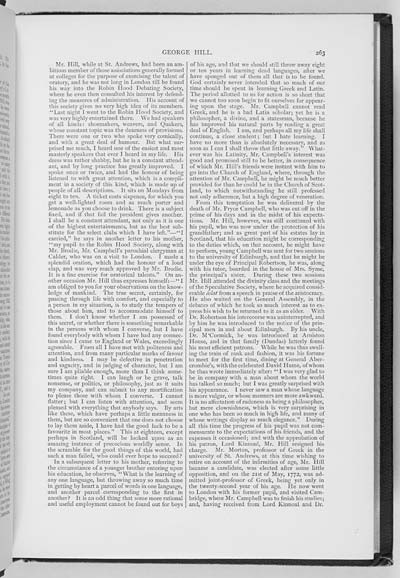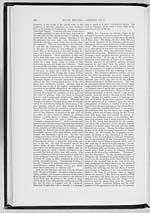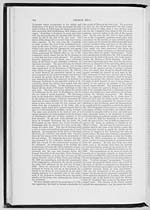263
Mr. Hill, while at St. Andrews, had been an am-
bitious member of those associations generally formed
at colleges for the purpose of exercising the talent of
oratory, and he was not long in London till he found
his way into the Robin Hood Debating Society,
where he even then consulted his interest by defend-
ing the measures of administration. His account of
this society gives no very high idea of its members.
"Last night I went to the Robin Hood Society, and
was very highly entertained there. We had speakers
of all kinds: shoemakers, weavers, and Quakers,
whose constant topic was the dearness of provisions.
There were one or two who spoke very comically,
and with a great deal of humour. But what sur-
prised me much, I heard one of the easiest and most
masterly speakers that ever I heard in my life. His
dress was rather shabby, but he is a constant attend-
ant, and by long practice has greatly improved. I
spoke once or twice, and had the honour of being
listened to with great attention, which is a compli-
ment in a society of this kind, which is made up of
people of all descriptions. It sits on Mondays from
eight to ten. A ticket costs sixpence, for which you
get a well-lighted room and as much porter and
lemonade as you choose to drink. There is a subject
fixed, and if that fail the president gives another.
I shall be a constant attendant, not only as it is one
of the highest entertainments, but as the best sub-
stitute for the select clubs which I have left."�"I
carried," he says in another letter to his mother,
"my pupil to the Robin Hood Society, along with
Mr. Brodie, Mr. Campbell's parochial clergyman at
Calder, who was on a visit to London. I made a
splendid oration, which had the honour of a loud
clap, and was very much approved by Mr. Brodie.
It is a fine exercise for oratorical talents." On an-
other occasion Mr. Hill thus expresses himself:�"I
am obliged to you for your observations on the know-
ledge of mankind. The true secret, certainly, for
passing through life with comfort, and especially to
a person in my situation, is to study the tempers of
those about him, and to accommodate himself to
them. I don't know whether I am possessed of
this secret, or whether there is something remarkable
in the persons with whom I converse, but I have
found everybody with whom I have had any connec-
tion since I came to England or Wales, exceedingly
agreeable. From all I have met with politeness and
attention, and from many particular marks of favour
and kindness. I may be defective in penetration
and sagacity, and in judging of character, but I am
sure I am pliable enough, more than I think some-
times quite right. I can laugh or be grave, talk
nonsense, or politics, or philosophy, just as it suits
my company, and can submit to any mortification
to please those with whom I converse. I cannot
flatter; but I can listen with attention, and seem
pleased with everything that anybody says. By arts
like these, which have perhaps a little meanness in
them, but are so convenient that one does not choose
to lay them aside, I have had the good luck to be a
favourite in most places." This at eighteen, except
perhaps in Scotland, will be looked upon as an
amazing instance of precocious worldly sense. In
the scramble for the good things of this world, had
such a man failed, who could ever hope to succeed?
In a subsequent letter to his mother, referring to
the circumstance of a younger brother entering upon
his education, he observes, "What is the learning of
any one language, but throwing away so much time
in getting by heart a parcel of words in one language,
and another parcel corresponding to the first in
another? It is an odd thing that some more rational
and useful employment cannot be found out for boys
of his age, and that we should still throw away eight
or ten years in learning dead languages, after we
have sponged out of them all that is to be found.
God certainly never intended that so much of our
time should be spent in learning Greek and Latin.
The period allotted to us for action is so short that
we cannot too soon begin to fit ourselves for appear-
ing upon the stage. Mr. Campbell cannot read
Greek, and he is a bad Latin scholar; yet he is a
philosopher, a divine, and a statesman, because he
has improved his natural parts by reading a great
deal of English. I am, and perhaps all my life shall
continue, a close student; but I hate learning. I
have no more than is absolutely necessary, and as
soon as I can I shall throw that little away." What-
ever was his Latinity, Mr. Campbell's interest was
good and promised still to be better, in consequence
of which Mr. Hill's friends were instant with him to
go into the Church of England, where, through the
attention of Mr. Campbell, he might be much better
provided for than he could be in the Church of Scot-
land, to which notwithstanding he still professed
not only adherence, but a high degree of veneration.
From this temptation he was delivered by the
death of Mr. Pryce Campbell, who was cut off in the
prime of his days and in the midst of his expecta-
tions. Mr. Hill, however, was still continued with
his pupil, who was now under the protection of his
grandfather; and as great part of his estates lay in
Scotland, that his education might be corresponding
to the duties which, on that account, he might have
to perform, young Campbell was sent for two sessions
to the university of Edinburgh, and that he might be
under the eye of Principal Robertson, he was, along
with his tutor, boarded in the house of Mrs. Syme,
the principal's sister. During these two sessions
Mr. Hill attended the divinity class and the meetings
of the Speculative Society, where he acquired consid-
erable eclat from a speech in praise of the aristocracy.
He also waited on the General Assembly, in the
debates of which he took so much interest as to ex-
press his wish to be returned to it as an elder. With
Dr. Robertson his intercourse was uninterrupted, and
by him he was introduced to the notice of the prin-
cipal men in and about Edinburgh. By his uncle,
Dr. M'Cormick, he was introduced at Arniston
House, and in that family (Dundas) latterly found
his most efficient patrons. While he was thus swell-
ing the train of rank and fashion, it was his fortune
to meet for the first time, dining at General Aber-
crombie's, with the celebrated David Hume, of whom
he thus wrote immediately after: " I was very glad to
be in company with a man about whom the world
has talked so much; but I was greatly surprised with
his appearance. I never saw a man whose language
is more vulgar, or whose manners are more awkward.
It is no affectation of rudeness as being a philosopher,
but mere clownishness, which is very surprising in
one who has been so much in high life, and many of
whose writings display so much elegance." During
all this time the progress of his pupil was not com-
mensurate to the expectations of his friends, and the
expenses it occasioned; and with the approbation of
his patron, Lord Kinnoul, Mr. Hill resigned his
charge. Mr. Morton, professor of Greek in the
university of St. Andrews, at this time wishing to
retire on account of the infirmities of age, Mr. Hilt
became a candidate, was elected after some little
opposition, and on the 21st of May, 1772, was ad-
mitted joint-professor of Greek, being yet only in
the twenty-second year of his age. He now went
to London with his former pupil, and visited Cam-
bridge, where Mr. Campbell was to finish his studies;
and, having received from Lord Kinnoul and Dr.

![]() Universal Viewer |
Universal Viewer | ![]() Mirador |
Large image | Transcription
Mirador |
Large image | Transcription
![]()

